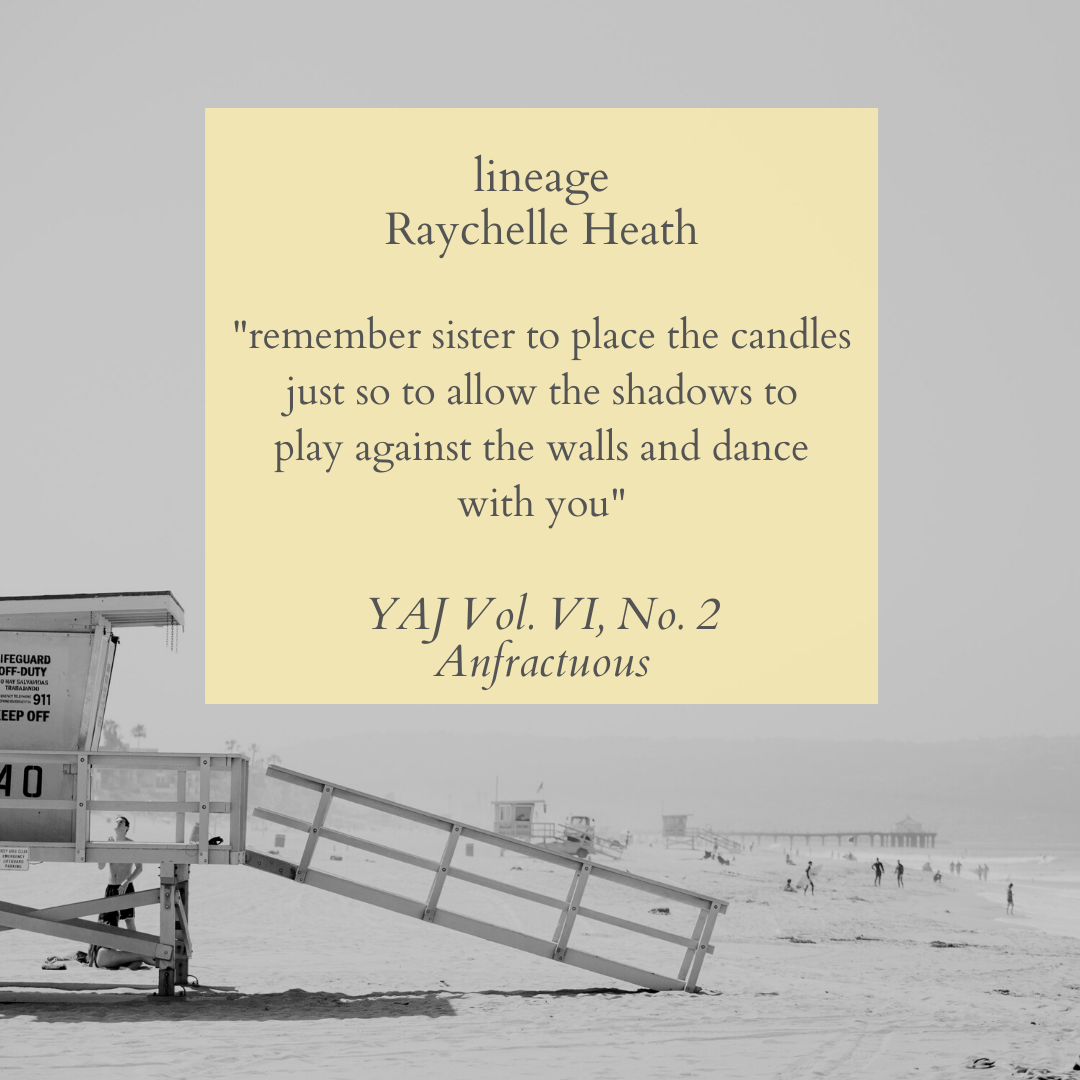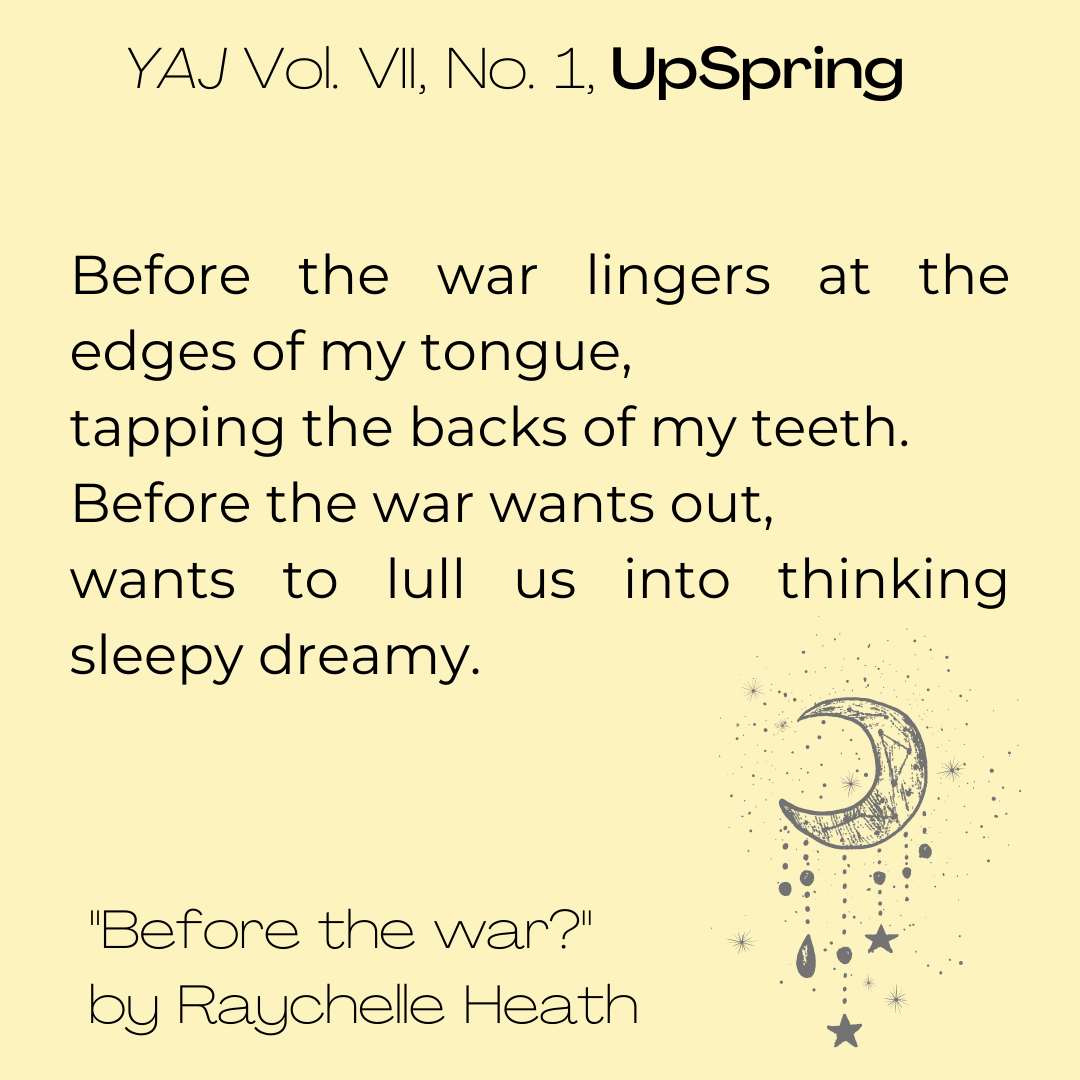Illuminating the Layers of Language and Shining a Light into Our Words
Yellow Arrow Publishing would like to announce the next guest editor for Yellow Arrow Journal, Raychelle Heath. Raychelle will oversee the creation of our Vol. VII, No. 2 issue. Mark your calendar! Submissions open September 1 and the issue will be released in November.
This next issue of Yellow Arrow Journal will be on the overarching concept of illuminating language. To learn more about this idea, read Raychelle’s words below. Yellow Arrow staff just finished voting on the issue’s theme, which will be released next week!
Raychelle was an ANFRACTUOUS and UpSpring poet with her incredible poems “lineage” and “Before the War?” and was our December 2021 .W.o.W. author. She holds a BA in languages from Winthrop University and an MFA in poetry from the University of South Carolina. She uses her poetry and her podcast to tell the multifaceted stories of black women in the world. Raychelle also explores her experiences with the culturally rich communities that she has encountered in her travels. Her work has been published by Travel Noire, Fourth Wave, Yellow Arrow Journal, The Brazen Collective, and Community Building Art Works. She currently works as curriculum director, sanctuary coach, and facilitator for the Unicorn Authors Club. She also regularly facilitates for The World We Want workshop.
Find out more about Raychelle at https://sites.google.com/view/theraychelleheath/.
Please follow Yellow Arrow on Facebook and Instagram for the theme announcement. Below, you can read more about Raychelle’s perspectives on illuminating languages. We look forward to working with Raychelle over the next few months.
By Raychelle Heath
In her essay “Language is Migrant,” Cecilia Vicuña writes, “Language is migrant. Words move from language to language, from culture to culture, from mouth to mouth. Our bodies are migrants, cells and bacteria are migrants too. Even galaxies migrate.”
From the moment we begin to speak we are also taught how to do it “correctly.” We are given rules and protocols for how to present ourselves when we open our mouths. As a little black girl growing up in the south, I knew there was a way to speak when I was home and when I was out in public. Without even realizing it, I was thrown into the task of codeswitching as a means of survival. There was one tongue I could use on the playground and when I was running wild with my cousins; we could use “ain’t,” “y’all,” and shorten words to “comin’” and “goin’” without fear of consequence. We could try on language we heard in music and on TV. But when we were back in school or in mixed company, our tongues got buttoned up. And as I moved into adulthood, I realized that even my southern accent was a marker for some people. I felt the double-edge of so-called compliments like “well-spoken.”
But language was also a place of freedom and exploration for me. A place where I could create new connections and understandings of the world. At the age of 13, I began learning Spanish and German. I poured myself into cultural study and deep listening. I wanted to fall into the way different people curled their tongues around words like “pan” and “vielleicht.” I wanted to understand how sounds reflected place, reflected time, reflected how we love and how we hold space for each other. And somewhere along the way, my tongue, my words, got free.
Then in 2007, I made a decision that would change my life forever. I left the United States to go live in the Marshall Islands. It was my first time living outside of the only country I had ever called home. And for the next two years, I would live and work in the city of Majuro, the capital of a remote string of atolls in the Pacific Ocean. I would learn the meaning of “aelin” and “enno.” I would fall in love with words like “emman” and “enana.” Their sounds, as much as their meanings, allowed me a way in to understand my new home, and the people who had welcomed me in with “yokwe.”
“Yokwe” means hello, but it can also mean care, and its direct translation is “I love you; you are a rainbow.” It is still one of my favorite words because of all that it does. And learning it allowed me to recognize sayings from my own southern roots that hold multitudes. Sayings like “you hungry” or “bless your heart” that hold so much care, but also call a person in. Or “sweet summer child” that feels so warm but also gives you a little tap on the head. These touchstone words and phrases lay a path for how I connect to the world and others around me. They lay a path for how I see the world and my place in it.
I currently call Costa Rica home, and their version of this is “pura vida.” Pura vida directly translates to pure life. However, it is used to say hello, goodbye, and even “oh well,” depending on the day. And I think that there couldn’t be a more fitting touchstone for a place where it is not an uncommon occurrence to see a toucan or a monkey, and there are cloud forests to explore. Where there is a constant reminder of the pure life that we can have by honoring the Earth that provides for us.
Language’s primary aim is to communicate, but the ways that words do so are layered. There is a richness that lives inside of each word and each phrase that we use. Toward the end of Cecilia’s essay she says, “Language is the translator. It could translate us to a place where we cease to tolerate injustice, abuse and the destruction of life. Life is language.” She then quotes the Kaushitaki Upanishad saying, “When we speak, life speaks.”
Language has the power to illuminate life. It has the power to speak the things that we love the most into existence, even when they aren’t physically there. I can speak the name of my grandmother and call her into the room. I can speak my freedom, even when the world feels oppressive. And when I let my language be completely free, I can illuminate the best and most authentic parts of myself and my culture. And language itself can be illuminated, looking at the constituent parts of words to layer meaning. Cecilia does this beautifully when she says, “I imagined ‘migrant’ was probably composed of mei, (Latin), to change or move, and gra, ‘heart’ from the Germanic kerd. Thus, ‘migrant’ became: ‘changed heart,’ a heart in pain, changing the heart of the earth. The word ‘immigrant’ really says: ‘grant me life.’”
Each day I get to meet the page and explore what my words really want to say is a gift. It is a gift to be able to let our unique sounds speak for us, to explore the fullness of their layers. It is a gift to illuminate our words and play in their depths. It is a gift to let our language dance and be free. I am grateful for all the languages that hold me, for all of the languages that have received me. And I invite us all to dig a little deeper, to strip away any societal trappings that may be holding our tongues hostage, and to notice what language flows from the heart.
*****
Yellow Arrow recently revamped and restructured its Yellow Arrow Journal subscription plan to include two levels. Do you think you are an Avid Reader or a Literary Lover? Find out more about the discounts and goodies involved at yellowarrowpublishing.com/store/yellow-arrow-journal-subscription. Yellow Arrow Publishing is a nonprofit supporting women writers through publication and access to the literary arts.
You can support us as we AWAKEN in a variety of ways: purchase one of our publications from the Yellow Arrow bookstore, join our newsletter, follow us on Facebook, Instagram, or Twitter or subscribe to our YouTube channel. Donations are appreciated via PayPal (staff@yellowarrowpublishing.com), Venmo (@yellowarrowpublishing), or US mail (PO Box 102, Glen Arm, MD 21057). More than anything, messages of support through any one of our channels are greatly appreciated.


